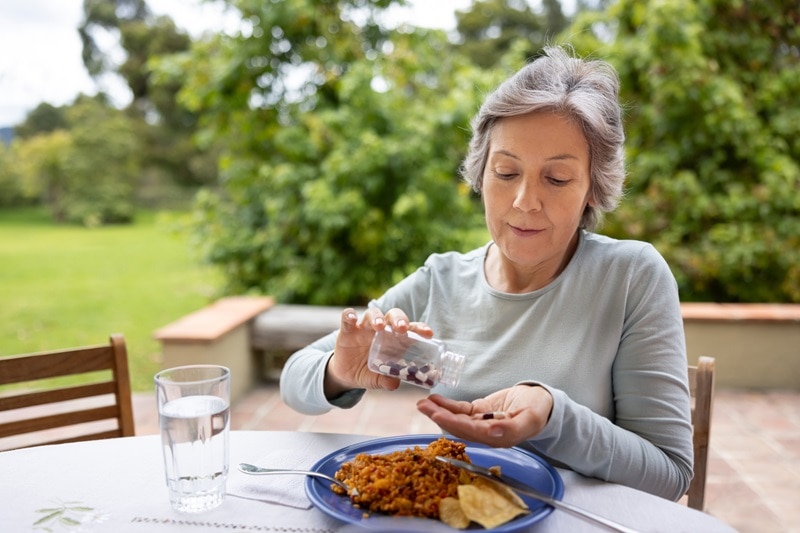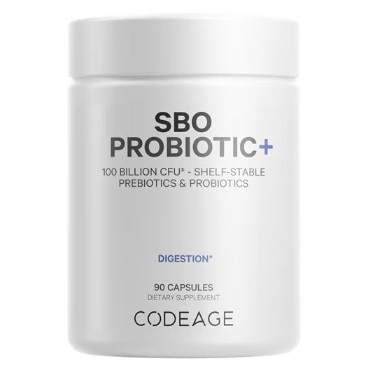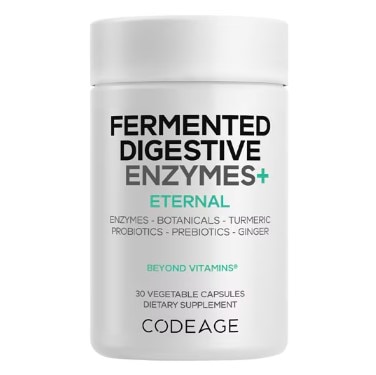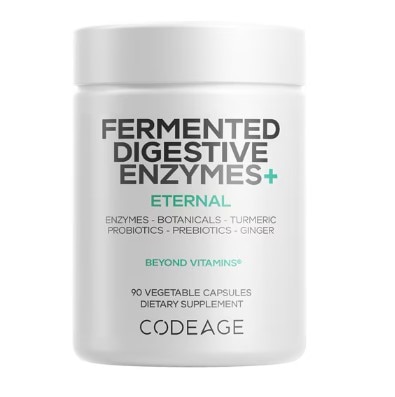Ever finish a meal and feel… not quite right? That uncomfortable bloating, the gurgling or just a general feeling of heaviness? If that sounds familiar, you’re not alone. About 61% of Americans report experiencing at least one gastrointestinal symptom in the past week, according to the American Journal of Gastroenterology.
For some people, digestive enzymes can be a helpful addition to a well-rounded diet that supports overall digestive health. While your body makes digestive enzymes naturally, if you’re short on certain ones, bothersome symptoms can emerge. Here’s what science says about using them effectively, including when to take them, how long they take to work, if you should combine them with probiotics and other practical tips.
Digestive enzymes aren’t for everyone, though, so it’s important to consult a doctor before starting enzyme supplements, especially if you have ongoing digestive problems or other health conditions.
How to Take Digestive Enzymes
What are digestive enzymes?
Digestive enzymes are proteins that act like tiny scissors, helping to break up your food through chemical reactions. Your body makes enzymes naturally in places like the salivary glands, stomach, and, in particular, the pancreas. Some, such as lactose, are also produced in the small intestine.
In some people, there can be times when the body doesn’t produce enough digestive enzymes due to conditions affecting the pancreas, or genetics that cause an abnormal gene mutation. Some have trouble producing specific enzymes that help digest particular foods, like dairy, in the case of lactose intolerance. When this happens, it also makes it difficult for your body to absorb the nutrients from those foods. For these people, taking digestive supplements can help ease symptoms.
Common types of digestive enzymes and the foods they help digest include:
- Amylase: carbs/starches
- Protease: proteins
- Lipase: fats
- Lactase: lactose/dairy
- Cellulase: Fiber
When to take digestive enzymes
Timing is key when it comes to taking digestive enzyme supplements. Usually, it’s best to take them with meals since they need food to work. You can take them just before or at the start of your meals to ensure the enzymes are in your stomach and ready to work when the food arrives.
For broad-spectrum digestive enzymes, stick to the ‘before or at the start’ of each meal. Specific enzymes, like lactase or proteases like papain, you can take them only before or at the start of meals that contain the foods they help digest—dairy and protein, respectively.
If you forget, it’s better to take them in the middle of your meal or right after than not to take them at all, but just before a meal is best. Try keeping your bottle on the table or nearby where you prepare your food to help you remember. Avoid taking digestive enzymes on an empty stomach for digestive purposes.
If you are taking prescription enzymes for a condition like pancreatitis, follow your doctor’s instructions exactly, which is typically to take them at every meal and snack as directed.
When you’ll start feeling a difference
You might not feel a difference right away, but typically, the results are quick. Since digestive enzymes get to work right away once they come into contact with food, you might notice relief from usual symptoms during the meal or shortly after you finish. Many people report feeling less bloating or discomfort within 30 to 60 minutes after a meal when they take enzymes.
Some factors can influence how much of a difference you’ll feel, including the amount of food you ate, what kind of foods were in your meal and the type and dose of enzymes you took. Plus, your individual digestive system can impact the timing, such as how fast or slow your digestion is.
If you don’t notice any difference, it might be that digestive enzymes aren’t the right answer to your particular problems, and it’s a good idea to see your healthcare provider for advice.
Taking enzymes with probiotics
Both digestive enzymes and probiotics are supplements that work on the digestive system. Enzymes break food down while probiotics help balance the gut and support gut health. You can take them together as they don’t typically interfere with each other.
Some probiotics can be taken with food, but others are best on an empty stomach, so check the label. There are also supplements like Codeage Fermented Digestive Enzymes with Probiotics and Prebiotics that combine them.
Potential side effects
Some people might experience side effects from taking digestive enzymes, such as nausea, diarrhea or cramping, especially if you take a high dose (or a higher dose than you need). Allergic reactions to some enzymes are possible, such as those derived from fruits like papain (from papaya) if you have a fruit allergy.
It’s crucial to talk to your doctor before starting enzymes, especially if you have health conditions or take medications like blood thinners or diabetes drugs, since enzymes can interact with them.




